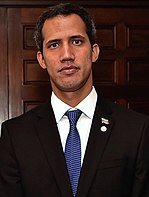



A crisis concerning who is the legitimate President of Venezuela has been underway since 10 January 2019, with the nation and the world divided in support for Nicolás Maduro or Juan Guaidó.
The process and results of the May 2018 Venezuelan presidential election were widely disputed. The opposition-majority National Assembly declared Maduro's presidency illegitimate on the day of his second inauguration, citing the 1999 Constitution of Venezuela enacted under Hugo Chavez, Maduro's predecessor. The body declared that his reelection was invalid, and declared its president, Juan Guaidó, to be acting president of the country. The pro-Maduro Supreme Tribunal of Justice said the National Assembly's declaration was unconstitutional.
Minutes after Maduro took the oath as president of Venezuela, the Organization of American States (OAS) approved a resolution in a special session of its Permanent Council declaring Maduro's presidency illegitimate and urging new elections. Special meetings of the OAS on 24 January and in the United Nations Security Council on 26 January were held but no consensus was reached. Secretary-General of the United Nations Antônio Guterres called for dialogue.
Maduro's government states that the crisis is a "coup d'état led by the United States to topple him and control the country's oil reserves."Guaidó denies the coup allegations, saying peaceful volunteers back his movement. As of May 2019, Guaidó has been recognized as the acting president of Venezuela by 54 countries. Internationally, support has followed traditional geopolitical lines, with allies China, Cuba, Iran, Russia, Syria, and Turkey supporting Maduro, and the US, Canada, and most of Western Europe supporting Guaidó as acting president.

Juan Guaidó
